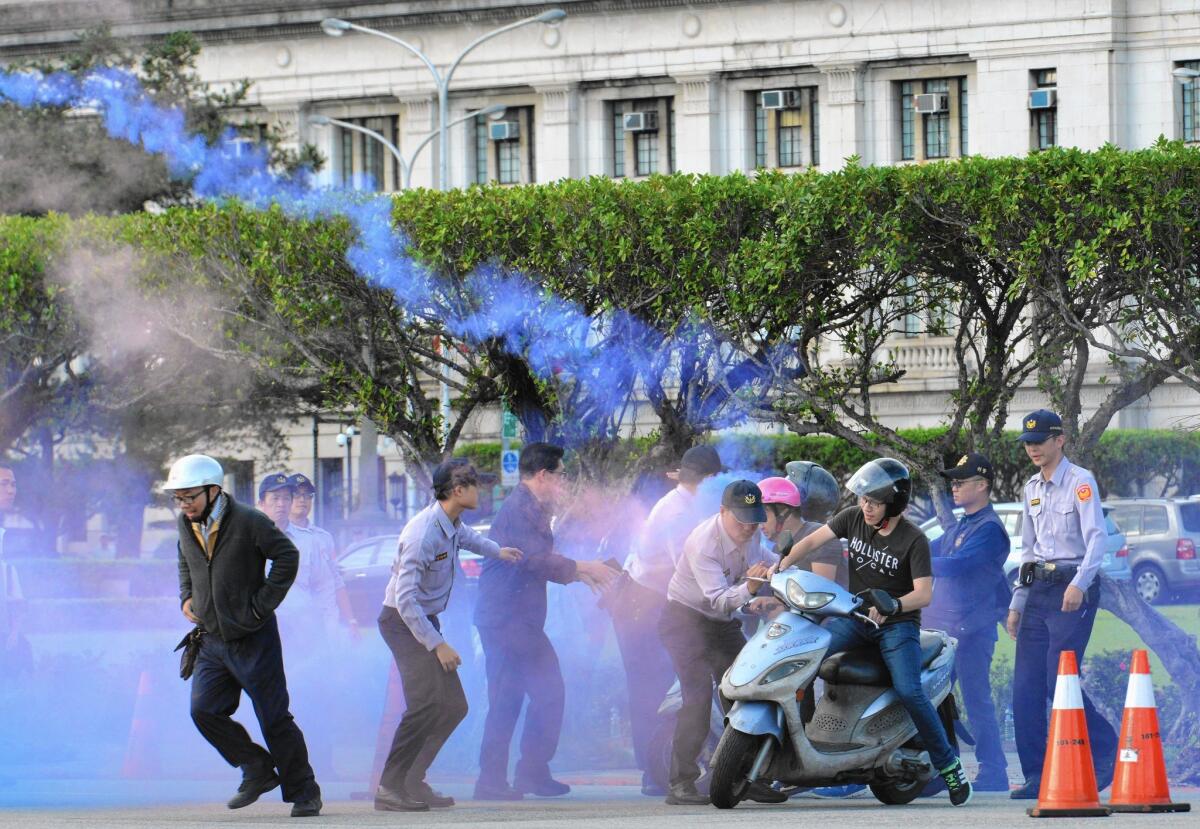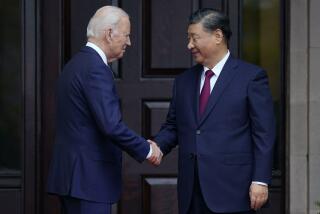In Taiwan, many question lame-duck president’s plan to meet with China

Why now?
As Taiwanese absorbed the news that their president, Ma Ying-jeou, would meet Saturday with Chinese President Xi Jinping, many expressed skepticism about the timing, coming just months before Ma is termed out of office.
“Ma is about to leave office, so here he goes to meet now with Xi. I can’t understand that,” said Wu Ching-lung, 40, a self-employed resident of Taipei, the Taiwanese capital.
The meeting, in Singapore, has been hailed as historic, the first between leaders of the two estranged governments since China’s civil war ended in 1949.
Such a meeting two or three years ago could have brought a breakthrough in relations, Wu said Wednesday. But with the presidential election set for January and Ma leaving office in May, the timing is suspicious, he believes, especially with Ma’s party trailing badly in the polls.
“I’m worried,” he said. “He might be doing something just before leaving office, but it’s not going to be much help to the common Taiwanese.”
Officials on both sides of the Taiwan Strait sought to play down expectations, saying that no joint statement would be released and no agreements would be signed. But Taiwan’s leading opposition party sharply criticized plans for the encounter, calling it an attempt to manipulate the upcoming vote on the island of 23 million and bolster support for Ma’s Nationalist Party.
“President Ma promised when he was reelected [in 2012] that he would not meet with Chinese leaders within four years. But now, he has arranged this kind of sudden meeting, and we ask him to give some answers,” Democratic Progressive Party spokesman Cheng Yun-peng said in a statement.
“What kind of meeting is this? What’s the purpose? Why has he rushed to meet with Xi at this time? How did he negotiate with the Chinese? What form of meeting will take place? What are the arrangements? What will he say and what will he do?”
The Democratic Progressive Party’s presidential candidate, Tsai Ing-wen, has been leading in the polls for months, in part because of voter unhappiness over Ma’s policies toward the mainland. The DPP has also benefited from a sense of frustration among voters that Ma’s administration conducts too much business in secret.
The DPP criticized the sudden announcement late Tuesday of the Xi-Ma meeting as yet another example of how the government “operates in a black box.”
“Right now, Taiwan is going through a new round of elections and President Ma decided to hold the meeting at this sensitive time,” Cheng added. “We can’t help but think this is a kind of political move with the purpose of influencing the election.”
Taiwan has had de facto independence since 1949, when Gen. Chiang Kai-shek’s Nationalist forces were defeated in China’s civil war by Mao Tse-tung’s Communist troops and fled to the island 100 miles off the mainland’s southeastern coast.
For decades, the Nationalist Party in Taipei asserted that it was the rightful ruler of all of China, while the mainland’s Communist government has always regarded Taiwan as a renegade province that must eventually be brought under Beijing’s control, by force if necessary.
Since Ma took office in 2008, lower-ranking officials have signed 23 deals with China establishing new trade, transit and investment links, even as the two sides have remained divided over Taiwan’s political status. In the last year and a half, though, a backlash has mounted in Taiwan against Ma’s pursuit of closer ties with the mainland.
The Xi-Ma meeting might add to perceptions that the Nationalists are too cozy with the mainland, said Denny Roy, a senior fellow at the East-West Center think tank in Honolulu. The meeting, he said, might cast Ma’s party as “a junior partner of the Chinese Communist Party.”
But both Ma and Xi have good reasons to meet, said Jin Zhong, a longtime analyst of Chinese politics. For both leaders, it is a chance to show off their achievements on cross-strait relations and for Ma in particular to seal his legacy.
Moreover, he said, “After a series of successful official visits to countries like the United States and Britain, a meeting with the Taiwanese president will also be another important milestone for Xi. It’ll help boost his image domestically.”
And with Tsai looking like a near-certain victor in the presidential race, and relations between her party and Beijing quite frosty, “this will also be the last chance [in years] for Xi to meet with a Taiwanese leader.... Tsai Ing-wen’s Democratic Progressive Party has always been more on the side of promoting the independence of Taiwan, although in recent years they have been focusing on maintaining the current status between Taiwan and the mainland.”
Ku Chung-hwa, a board member with the Taiwanese legislative monitoring group Citizen Congress Watch, said he believed many Taiwanese are likely to reserve judgment about the meeting until they see the results. Some regard the event as a natural culmination of the routine lower-level government meetings since 2008, and believe it may herald better relations.
“For me, I think it’s a significant meeting, a start to communication between two leaders,” said Ruby Liu, a graduate of National Chengchi University in Taipei. Elections will be unaffected, she added, because “Taiwanese are already disappointed in the Nationalist government.”
A key factor in how Taiwanese perceive the meeting is whether Ma and Xi look to be on equal footing. The protocol of the meeting will be delicate. Mainland officials said Xi and Ma would not address each other as “president” but as “Mr. Ma” and “Mr. Xi.”
The leaders are expected to meet Saturday afternoon, hold separate news conferences and then have dinner together.
The DPP called on Ma as “head of state, to maintain his integrity with his actions and words.” The party said he ought to “demonstrate that he is representing the sovereignty and national dignity … and not hurt our national dignity and our value of democracy and freedom.”
John D. Ciorciari, a China scholar at the University of Michigan, said Xi and Ma are certainly aware that their meeting is unlikely to help the Nationalists recover at the polls. But they may be thinking further down the road.
Because a meeting with Tsai would be unlikely, “if Xi wants to set a precedent for them in the near term, he needs to do it now,” Ciorciari said.
“The Xi-Ma meeting isn’t likely to produce major deliverables, because neither president wants to see a DPP landslide in the legislature or drive Taiwanese voters much further away,” he added. “But Xi and Ma both appear to see longer-term advantages of breaking the ice on direct engagement by leaders.”
Special correspondent Jennings reported from Taipei and Times staff writer Makinen from Beijing.
Twitter: @JulieMakLAT
ALSO:
Federal judge slaps Justice Department for limits on medical marijuana
Justin Trudeau sworn in as Canada’s first Generation X prime minister
Family of Chinese mom who died after birth complications gets $5.2 million
More to Read
Start your day right
Sign up for Essential California for news, features and recommendations from the L.A. Times and beyond in your inbox six days a week.
You may occasionally receive promotional content from the Los Angeles Times.






